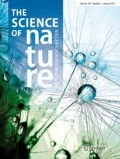Arnold Berliner was the founding editor of Naturwissenschaften (NAWI). In 1912, he proposed to Ferdinand Springer, owner of the Springer Publishing Company, the founding of the journal, which he led and developed over the following 22 years. In his first editorial published in 1913, Berliner stated that NAWI should ‘inform all those working in scientific fields, either researchers or teachers, about what interested them outside their own fields’ (translated from German; Naturwissenschaften 1(1):1; published 3 January 1913; Autrum 1988) (Fig. 1).
Berliner's vision to fill a gap in the communication of science, in particular the need for synthesising knowledge from all the branches of science, and to translate this knowledge to lay audience was well ahead of most journals of his time. During the Weimar Republic, NAWI gained acceptance across wide parts of educated German-speaking society and emerged as a voice for science that did not only address scientific peers (Stöltzner 2002). His dedication and success in taking on board this difficult task was acknowledged by the great level of support expressed on the occasion of his 70th birthday, including by Einstein (1932) who, among others, had continuously encouraged Berliner in his activities.
Berliner was Jewish. On 13 August 1935, he was dismissed from the journal as part of the non-Aryan policies implemented by the NAZI government. On 22 March 1942, aged 79, Arnold Berliner, the German Jewish Physicist, committed suicide.
NAWI is turning 100 years in 2013, and this occasion will be celebrated as a milestone for science. Today, NAWI is part of an international system of scientific journals that seek for standardisation of quality and advance in science (Thatje 2012), and from today's perspective, the role of academic journals during the volatile political decades of the first half of the twentieth century is difficult to comprehend. The journal's history is a success history of twentieth century science, but at the same time cannot be separated from some of the very darkest parts of modern history, over-shadowing its early existence.
To honour Arnold Berliner's dedication to science and his journal, I herein, and on behalf of the publisher Springer, introduce the Arnold Berliner Award. In recognition of our founding editor, this award will be given annually, for the best research article published in NAWI during the previous calendar year. Criteria are excellence in science, originality and in particular interdisciplinarity, overall mirroring Berliner's motivation for initiating NAWI. The awardee will be selected by the board of editors and be announced for the first time in 2013.
Not much is known about the human being behind the name; Berliner—the German who had witnessed and lived turbulent times of German and European history, from the German Empire through WWI, the Weimar Republic, WWII and the Holocaust, a victim of his own nation—however, may have seen science and his journal as much more than a means of communicating knowledge. It is that in his first editorial published in 1913 he finishes his request for support of NAWI with the sentence:
We direct our request to scientists of all countries, irrespective of political borders, with the hope for collaboration, in the interest of all and for a common task, which equally concerns all scientists.
References
Autrum H (1988) Arnold Berliner und die “Naturwissenschaften”. Naturwissenschaften 75:1–4
Einstein A (1932) Zu Dr. Berliners siebzigstem Geburtstag. Naturwissenschaften 20:913
Stöltzner M (2002) Mit Mimose und Stachelschwein (Arnold Berliner und Die Naturwissenschaften). Süddeutsche Zeitung, 22 March, p. 13
Thatje S (2012) Naturwissenschaften: recent advances, changes and challenges. Naturwissenschaften 99:1–2
Author information
Authors and Affiliations
Corresponding author
Rights and permissions
About this article
Cite this article
Thatje, S. Introducing the Arnold Berliner Award . Naturwissenschaften 99, 675–676 (2012). https://doi.org/10.1007/s00114-012-0958-5
Published:
Issue Date:
DOI: https://doi.org/10.1007/s00114-012-0958-5


